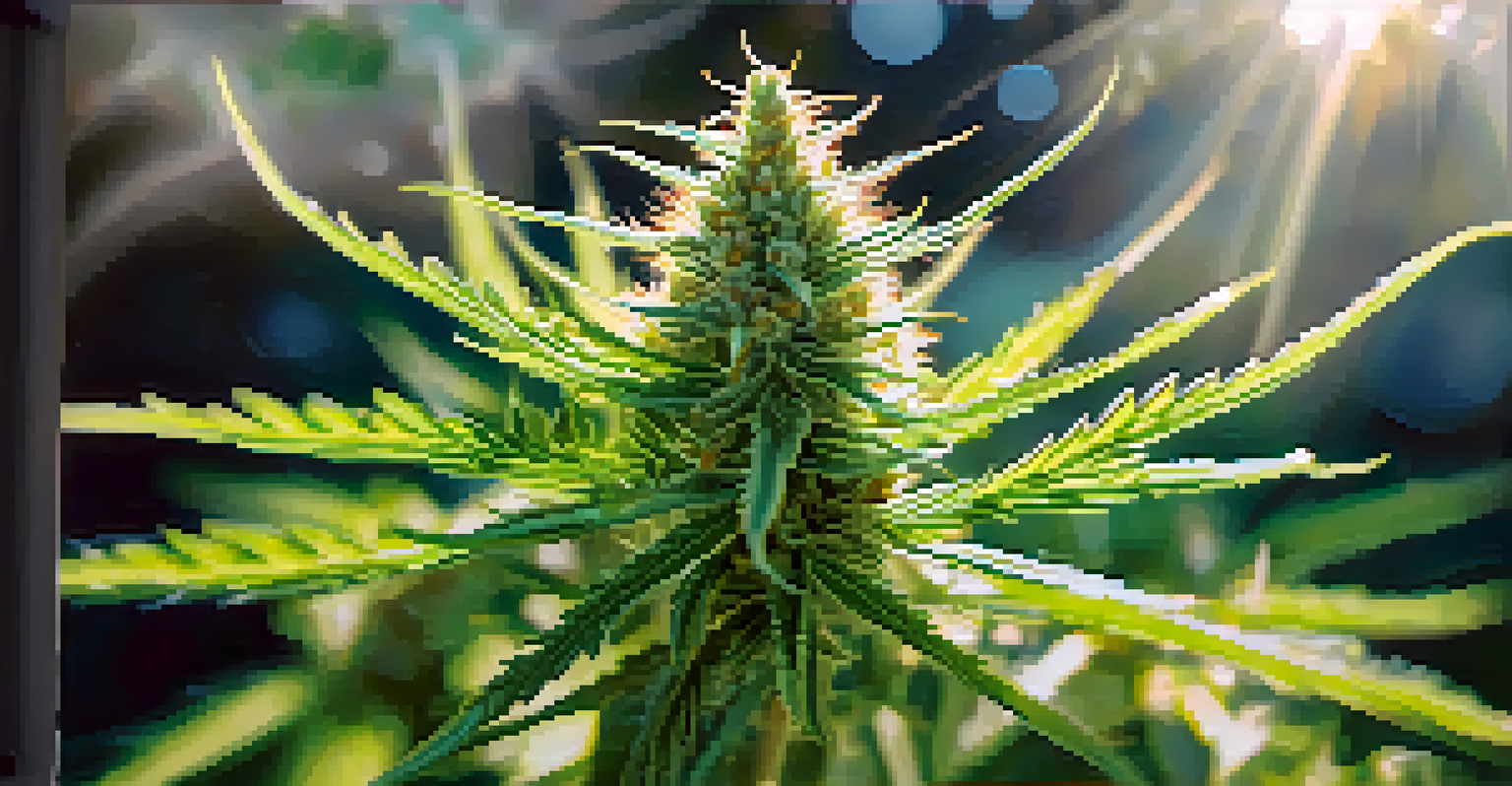Understanding the Risks of Marijuana on Mental Health Issues

The Growing Conversation Around Marijuana and Mental Health
As marijuana becomes more widely accepted and legalized, discussions about its effects on mental health are gaining momentum. Many people view it as a natural remedy for anxiety or depression, but the reality may be more complex. Understanding the potential risks is crucial for anyone considering its use, especially those with pre-existing mental health conditions.
The greatest danger of marijuana use is that it can lead to a cycle of dependency where individuals rely on it to cope with their mental health challenges, potentially exacerbating those very issues.
Research indicates that while some users experience short-term relief, marijuana can also exacerbate symptoms of certain mental health disorders. This duality can create confusion, making it essential to delve deeper into the science behind marijuana's effects. It’s not just about the high; it’s about understanding the long-term implications on mental well-being.
Related Resource
Moreover, societal perceptions are shifting, with more individuals openly sharing their experiences. This open dialogue can help demystify marijuana’s effects and encourage informed decisions. However, it's vital to ground these conversations in research to ensure that they are both honest and helpful.
Understanding THC and Its Impact on Mental Health
Tetrahydrocannabinol (THC) is the primary psychoactive compound in marijuana, and it plays a significant role in its effects on mental health. When consumed, THC interacts with the brain's endocannabinoid system, leading to altered perceptions and mood changes. While some users may enjoy these effects, others might find them overwhelming or distressing.

For individuals predisposed to anxiety or paranoia, high levels of THC can trigger or worsen these feelings. This is especially concerning for young adults and adolescents, whose brains are still developing and may react differently to THC. Understanding this compound is essential for identifying potential risks associated with marijuana use.
Marijuana's Complex Mental Health Effects
While marijuana may provide short-term relief for some mental health issues, it can also exacerbate symptoms and lead to dependency.
In addition to anxiety, THC can also impact cognitive functions such as memory and attention. Long-term use may lead to persistent changes in brain function, particularly in younger users. It’s crucial to recognize that while THC can provide relief for some, it can be a source of distress for others.
The Link Between Marijuana and Psychosis
Emerging research has identified a concerning link between marijuana use and psychosis, particularly in individuals with a genetic predisposition. Psychosis is characterized by a disconnection from reality, which can manifest as hallucinations or delusions. For some users, especially those consuming high-potency marijuana, the risk of experiencing these symptoms increases significantly.
While cannabis may provide temporary relief, understanding the long-term effects on mental health is crucial for anyone considering its use.
Studies suggest that regular use of marijuana can heighten the risk of developing psychotic disorders, such as schizophrenia, particularly in teens and young adults. This connection raises important questions about the safety of marijuana, especially for vulnerable populations. It's critical to approach marijuana consumption with awareness of these potential risks.
Related Resource
This concern is compounded by the fact that many young users may not recognize the signs of emerging mental health issues. Early intervention is key in preventing long-term consequences, making education about the risks associated with marijuana vital for both users and their support networks.
Marijuana Use and Anxiety Disorders: A Double-Edged Sword
Many individuals turn to marijuana in hopes of alleviating their anxiety symptoms. While some report immediate calming effects, the relationship between marijuana and anxiety is more nuanced. For some, marijuana can serve as a temporary escape, but it can also lead to increased anxiety levels when the effects wear off.
Chronic marijuana use may create a cycle where users rely on it to manage their anxiety, potentially leading to dependence. This reliance can interfere with the development of healthier coping mechanisms and ultimately exacerbate the very issues they seek to alleviate. Understanding this cycle is crucial for anyone considering marijuana as a treatment option.
THC and Psychosis Risks
Research indicates a concerning link between high-potency marijuana use and an increased risk of psychosis, particularly in vulnerable individuals.
Therefore, it is essential to approach marijuana use with caution, particularly for those already facing anxiety disorders. Consulting with a mental health professional can provide clarity on whether marijuana is a beneficial option or a risky gamble.
Marijuana and Depression: What Does the Research Say?
The relationship between marijuana and depression is another area of extensive research, with mixed findings. Some users claim that marijuana helps lift their mood and offers temporary relief from depressive symptoms. However, studies indicate that long-term use may be linked to increased rates of depression, particularly in heavy users.
This paradox suggests that while marijuana may provide short-term relief, it could contribute to a cycle of mood fluctuations that ultimately worsen depression. The potential for dependency can lead to feelings of hopelessness or sadness when not using the substance, making it essential to analyze individual experiences. Understanding this connection is vital for users seeking to manage their mental health.
Related Resource
Additionally, marijuana’s effects can differ significantly based on individual biology and the specific strain used. This variability makes it imperative for users to monitor their mental health closely and seek professional guidance when necessary.
The Role of CBD in Mental Health: A Safer Alternative?
Cannabidiol (CBD), another compound found in marijuana, is often touted as a safer alternative to THC for managing mental health issues. Unlike THC, CBD does not produce a high, making it appealing for those who want to avoid psychoactive effects. Initial research indicates that CBD may have potential benefits for anxiety and depression without the risks associated with THC.
While early studies show promise, it’s essential to remember that research on CBD is still developing. Users should approach CBD with an open mind but also a critical eye, recognizing that not all products are created equal. Quality and dosage can greatly influence its effectiveness, so seeking reputable sources is crucial.
CBD as a Safer Alternative
Cannabidiol (CBD) may offer potential mental health benefits without the psychoactive effects of THC, but users should proceed with caution and seek professional advice.
Ultimately, while CBD may offer a viable option for some, it’s important to consult with healthcare professionals before starting any new treatment. This ensures that individuals make informed decisions that align with their mental health needs.
Navigating the Risks: Making Informed Choices About Marijuana
Navigating the world of marijuana can be daunting, especially when it comes to mental health. With the rising popularity of cannabis, it’s vital to be well-informed about its potential risks and benefits. Understanding your mental health history and any predispositions to disorders can guide your decisions regarding marijuana use.
It’s also essential to consider personal goals and motivations for using marijuana. Are you seeking relief from anxiety or depression? Or are you simply curious about the experience? Reflecting on these questions can help clarify whether marijuana is the right path for you or if other options might be more beneficial.

Finally, maintaining open communication with healthcare providers is crucial for making informed choices. They can provide guidance tailored to your unique circumstances, helping you weigh the risks and benefits effectively.